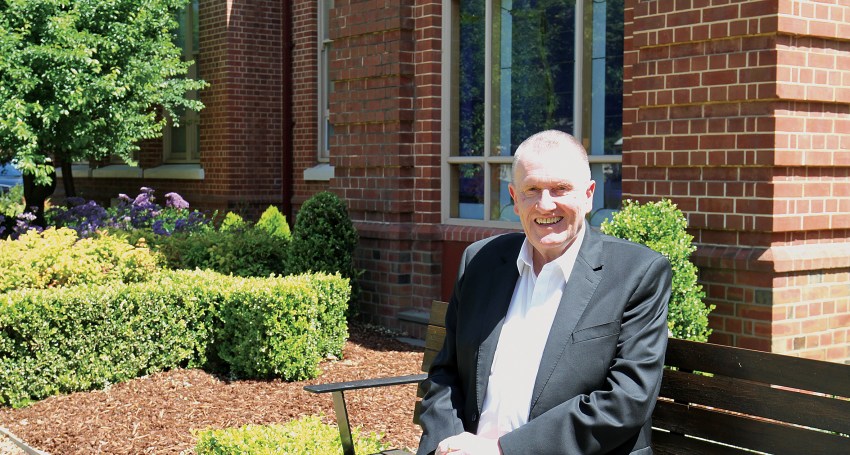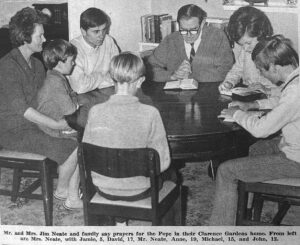Lifelong love of education
People
Since taking over from the highly respected Professor Denis Ralph as chair of the South Australian Commission for Catholic Schools, John Neate has been putting his own stamp on the body responsible for 101 schools educating 52,000 students across the State.

John Neate swears he never had a day when he didn’t love going to school.
“I can’t remember a day, whether at St Anthony’s at Edwardstown or Sacred Heart College, that I didn’t feel valued or at home,” said the new chair of the South Australian Commission for Catholic Schools.
“That’s something I’ve often spoken of as a principal to teachers, would our students say that about this place? It’s a lucky thing to be able to say, it’s probably why I became a teacher to be honest.”
Advertisement
Fifty years on from his matriculation at Sacred Heart, John aspires for every child to feel that way as he plays a key role in ensuring Catholic education continues to flourish in the Adelaide and Port Pirie dioceses.
“It’s exciting times, but we can’t take it for granted and rest on our laurels,” John said.
“Catholic schools have never been so popular, parents are supporting us and saying there’s something here that they value.
“I think to be Catholic is to be welcoming, that invitation, in Jesus’ words, to ‘come and see’ what we do, how our schools are authentically Catholic, not Catholic like they were when I went to Sacred Heart, but Catholic in another way.”
John’s own experience of growing up ‘Catholic’ at Clarence Gardens in the late 50s/60s is typical of that time: one of five children (the youngest coming seven years after John); an aunt in the convent and an uncle a priest; parish picnics; and, of course, Mass every Sunday.
Family life revolved around the Edwardstown parish and his parents, Jim and Dorothy, were involved in the Christian Life Movement with friend and then editor of
The Southern Cross Fr Bob Wilkinson, who once asked the family to pose for a photo about prayers for the Pope.
Education was a priority for Jim, who left school after Grade 7 and became a plasterer.
“He had this thing that his kids were never going to work with their hands,” John said.
“Mum worked in offices and the TAB to help put all five of us through school.
“Three of us ended up teachers and two lawyers, so Dad had his way.”
Recalling his days at Sacred Heart on the eve of his 50-year reunion, John had nothing but praise for the Marist Brothers and said by far his most influential teacher was Brother Conrad Lynch.
“I was hopeless at maths so he would spend lunch times helping me because you had to do maths in Leaving. I just scraped in but he said ‘it doesn’t matter, you passed, that’s fantastic’.
“I think I saw the Brothers as very human, in our family religious were always around so you didn’t put them on a pedestal.”
After studying an Arts degree and diploma of Education at Flinders University, John’s first teaching position was at the newly established Thomas More College at Salisbury in 1979.

John Neate pictured with his family in The Southern Cross in 1968.
“There were 130 students in just four classes and of the eight staff, four of us were first year teachers,” he said.
“We had no idea what we were doing but we were backed and trusted to have a go.”
John spent 14 years in the rapidly growing northern school under the leadership of the Jesuit principal Fr Jim Hawkins who once told him ‘you should leave a school when you’re happy to stay’.
Advertisement
That’s exactly what John did. He loved teaching at Thomas More but he wanted to “push himself and do something different”. He moved to all-girls school Kildare College at Holden Hill to be Religious Education coordinator.
This was a new challenge but within two years he was appointed deputy principal and then principal for four years. He also met his wife, Tina, then a teacher at Kildare and now the principal.
“If I hadn’t been brave enough (to move) life would have been very different,” he reflected.
When the principal position became vacant at Cabra Dominican College, close to where he had grown up and where his sister was educated, he decided to give it a go.
“I could have stayed at Kildare longer but Cabra had always interested me…opportunities like this only come up every 10 or 12 years and I thought the timing might not be great but I’ll go for it,” he said.
After seven and a half years and early into his second term as principal, Tina started talking about her long-held desire to work overseas. Within a couple of weeks she had a Skype interview organised for an international school in Prague and soon they were heading to Europe with their two young sons in tow.
Initially planning to work there for two years, John and Tina loved it so much they stayed for five.
“It was just beautiful, I’m biased but I think it’s the most beautiful city,” he said.
“We never worked for longer than five weeks, after that you would have a break and you’d see all the teachers at the train station heading off to somewhere in Europe.
“We’d go to London for the weekend to watch a game of football, just because you can. It was an amazing experience.”
The decision to return to Australia in 2014 was difficult but John said if they stayed longer Prague would “become home” and there was a “pull” to be back with family.
Such is their affection for the city and the friends they made there, they have been back half a dozen times and John is planning another trip there next year.
John and Tina were no longer employed by Catholic Education SA (CESA) but Tina returned to Kildare and rose to the positions of deputy principal and principal while John’s friend Rob Thomas, principal of St Patrick’s Technical College, asked him to come and do some relief work.
“I loved it and so following year I became the Religious Education coordinator and I worked there right up until last year when I retired,” he said.
“It was a really nice way to finish my teaching, it’s a place where the Church should be.”
John proudly acknowledged the 100 apprentices a year that the college produces and the impact on families where in some cases there has been generational unemployment.
He also sees the irony in his involvement in a school that focuses on “working with your hands” – just what his father didn’t want.
“He never taught us anything in the shed, we were all useless at the practical things, and yet I ended up in a tech school where the students were cleverer and more skilled than me in so many ways,” John said.
“Finally, someone was taking an interest in them, most of them had never got an academic award before and now they were being recognised.”
It didn’t take long after John retired at the end of last year for him to be called in by CESA executive director Neil McGoran.
“I got farewelled on Monday at the staff reflection day and I had an appointment to see Neil the next morning,” he said.
“I thought he just going to wish me well on my retirement – I had already been on SACCS for six years so we’d worked together, but then he told me the Archbishop’s asked me to ask you to do a job.
“I was humbled and touched, it’s quite a privileged position.”
After telling principals at one of their regular gatherings that he’d like to be invited to see their schools, John began the task of visiting schools in both dioceses.
Fittingly, the first principal to invite him was Corey Tavella at Thomas More College, where his journey in Catholic education began.
With SACCS being responsible for Catholic schools in all of South Australia – 87 in Adelaide Archdiocese and 14 in Pirie Diocese – John has already covered a lot of ground as he travels around the State.
From driving a tractor at the Agricultural Centre at St Mark’s College, Port Pirie, to checking out the only regional school rowing program at St Francis of Assisi College at Renmark, John said he was enjoying witnessing the diversity of Catholic schools.
“They’ve all got their own flavour, history, geography, charism, but there is something that holds them all together, something recognisable,” he explained.
As for the priorities for SACCS, John said making sure there were schools in the right places, aligned to population growth and where the Church needs to have a presence, was high on the list.







